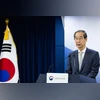South Korea’s parliament impeached Acting President Han Duck-soo, dealing another blow to a government already reeling after President Yoon Suk Yeol’s suspension less than two weeks ago for his brief martial law decree.
Lawmakers voted 192-0 in favor of Prime Minister Han’s impeachment on Friday, according to National Assembly Speaker Woo Won-shik. He said before the vote that a simple majority in the 300-seat parliament was needed for the motion to pass, instead of the two-thirds required to suspend a president.
The main opposition Democratic Party, which holds 170 seats, filed the motion to impeach Han on Thursday after he resisted pressure to immediately appoint three judges to the Constitutional Court, which would boost the likelihood of a ruling to finalize Yoon’s removal from power.
Dozens of ruling party members protested by chanting slogans calling for Woo’s resignation and boycotting the vote. Han said in a statement that he would respect the National Assembly’s decision and suspend his duties.
This is the first time an acting president has been impeached in South Korea. Han took over the role after Yoon was impeached by parliament following his Dec. 3 decision to impose martial law, a move that was reversed six hours later. The crisis has rattled financial markets and disrupted Seoul’s diplomacy efforts with partners like the US, all while the country’s facing mounting economic challenges and nuclear threats from North Korea.
Finance Minister Choi Sang-mok, who now steps in as interim leader, said he will work to minimize any confusion in government operations. He has also instructed the Joint Chiefs of Staff to increase monitoring of North Korea to prevent any provocations that might arise, he said in a statement.
It would be nearly impossible for Choi to effectively manage all the roles including finance minister, acting president and acting prime minister simultaneously, according to Shin Yul, a political science professor at Myongji University in Seoul. “This is not a normal situation in a country,” he said.
Also Read
The South Korean won declined 0.6 per cent against US dollar after the vote. The currency earlier fell as much as 1.1 per cent to the lowest since 2009 on Friday.
Han said in an emergency public address Thursday that he would hold off on approving the three judges nominated by parliament. He added that the right to approve the judges rests with the president of the nation.
Choi didn’t indicate in his statement whether he would follow Han’s position on the appointment of judges. The Democratic Party has called on Choi to make the appointments immediately.
Court Process
The court, which can still rule with six judges, held its first pre-trial hearing Friday and has until June to make a decision. Yoon has vowed to fight in court, saying he declared martial law to protect the nation from an opposition that’s trying to paralyze the government with impeachment motions and cuts to budget plans.
The case against the president is more important and urgent than any other impeachment motion involving government officials, Constitutional Court judge Cheong Hyungsik said at the hearing on Friday, according to a pool report. The court has scheduled the next preliminary hearing for Jan. 3.
The political turmoil adds to the risks facing South Korea’s economy, which is expected to grow at a slower pace next year. Export momentum is weakening due to lower semiconductor demand, and companies are bracing for Donald Trump’s return to the White House and his protectionist policies.
Recent surveys show confidence among South Korean consumers and businesses has slumped the most since the Covid-19 pandemic. Policymakers have pledged “unlimited liquidity” if needed to reassure market participants and mitigate the economic fallout. The central bank said it would cut its benchmark interest rate next year while considering financial risks and economic conditions.
Shin said the political uncertainty could spark an outflow of foreign capital. This would worsen the balance sheets of companies due to their large amounts of dollar-denominated debt, he added.
)